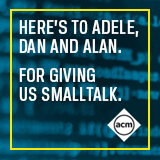
Debugging Devices:
What is the proper way to debug malfunctioning hardware?
I suggest taking a very sharp knife and cutting the board traces at random until the thing either works, or smells funny! I gather you’re not asking the same question that led me to use the word changeineer in another column. I figure you have an actually malfunctioning piece of hardware and that you’ve already sent three previous versions back to the manufacturer, complete with nasty letters containing veiled references to legal action should they continue to send you broken products.
Scaling in Games & Virtual Worlds:
Online games and virtual worlds have familiar scaling requirements, but don’t be fooled: everything you know is wrong.
I used to be a systems programmer, working on infrastructure used by banks, telecom companies, and other engineers. I worked on operating systems. I worked on distributed middleware. I worked on programming languages. I wrote tools. I did all of the things that hard-core systems programmers do.
Code Spelunking Redux:
Is this subject important enough to warrant two articles in five years? I believe it is.
It has been five years since I first wrote about code spelunking, and though systems continue to grow in size and scope, the tools we use to understand those systems are not growing at the same rate. In fact, I believe we are steadily losing ground. So why should we go over the same ground again? Is this subject important enough to warrant two articles in five years? I believe it is.
Better Scripts, Better Games:
Smarter, more powerful scripting languages will improve game performance while making gameplay development more efficient.
The video game industry earned $8.85 billion in revenue in 2007, almost as much as movies made at the box office. Much of this revenue was generated by blockbuster titles created by large groups of people. Though large development teams are not unheard of in the software industry, game studios tend to have unique collections of developers. Software engineers make up a relatively small portion of the game development team, while the majority of the team consists of content creators such as artists, musicians, and designers.





